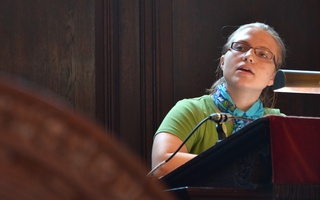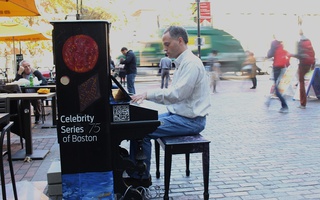Harvard Business School professor emeritus Howard H. Stevenson is currently a trustee of some of Boston’s most prestigious organizations including the Boston Museum of Science and the Isabella Stewart Gardner Museum. Yet by all accounts, Stevenson’s life should have ended almost six years ago.
On January 3, 2007, Stevenson was walking across the Business School campus when he suffered a heart attack and collapsed in front of Baker Library. But thanks to a remarkable set of circumstances, he was rescued that day.
At the time, Baker Library was the only building on the Business School campus with a mobile defibrillator. While one colleague rushed inside, a second, who had just completed CPR training two weeks earlier, came to his side and began performing CPR.
Stevenson was rushed to Mount Auburn Hospital, where he was put into a medically induced coma. Three days later, he was brought out by doctors, who found no cognitive damage despite his heart having stopped for four minutes.
If Stevenson had passed away that day, he says he would not have had many regrets. Yet a former student, Eric C. Sinoway, was startled by the possibility of losing a close friend and mentor. Sinoway began to record some of the lessons Stevenson had taught him and ultimately published a book in October 2012 titled “Howard’s Gift: Uncommon Wisdom to Inspire Your Life’s Work.”
“At the moment that I learned Howard had cheated death,” Sinoway writes in the book’s opening pages, “I had made a subconscious decision...to capture some of the wisdom that Howard had been effortlessly dispensing—and to share that wisdom with people who’d never have the chance to learn from him directly.”
During Stevenson’s time at Harvard, he has worn many hats. When he retired from teaching in 2011, he had been a Harvard professor for 40 years. As senior associate dean of the Business School from 2001 to 2005, he led a capital campaign which raised close to $600 million. And from 2005 to 2007, he served as a vice provost of the University.
It was through Stevenson’s position as a vice provost that he and Sinoway first met. Sinoway, a student at the Kennedy School, was working on a project to understand the funding model of the University. He sought out Stevenson’s advice, and what began as an academic relationship soon developed into a deep personal bond.
“I thought that there were innumerable smart people at Harvard, obviously, but he was wise,” Sinoway said in an interview. “I thought that there was a big difference between intelligence and wisdom, and I gravitated towards him.”
In “Howard’s Gift,” Sinoway records a number of lessons that his mentor taught him, including Stevenson’s advice about the dangers of simultaneously taking on too many commitments.
“It’s possible to get straight A’s when you’re a student,” Stevenson says in the book. “But life is not a classroom. We can’t get an A on every facet of life every single day.... It’s almost one of the physical laws of the universe, like you can’t be in two places at the same time.”
Sinoway says that this lesson became apparent at a certain stage in Stevenson’s life. In 1982, Stevenson was the co-founder and first president of an investment company called the Baupost Group. While performing those duties in addition to his responsibilities at the Business School, Stevenson admitted in retrospect, he was “getting a B minus or a C plus in the overall father dimension.”
Then one day, Stevenson’s wife “walked away from their marriage,” leaving him with three boys, according to the book. That forced Stevenson to reconsider his priorities. He ultimately decided to step down from his position at Baupost, forgoing tens of millions of dollars of future income, the book says.
“It was a situation where I needed to earn a consistently good grade as a father, for an extended period,” Stevenson says in the book. “I couldn’t risk some aspect of my family responsibilities slipping through my fingers.”
During his divorce, Stevenson was convinced that he could learn important lessons from what he called was an inflection point.
Read more in News
Summers Takes On Economic Project at Washington Think TankRecommended Articles
-
Notion of Success DebatedThree speakers—each with ties to business or religion—discussed different perspectives on how to define personal success.
-
Business School Publishing Arm RestructuresHarvard Business School’s publishing arm has recently restructured itself to streamline the editorial process in response to the changing nature of the publishing industry.
-
HBS Alum Dinners ConcludeTen Harvard Business School students piled into rental cars to be whisked from the Allston campus across the river to ...
-
To Talk About an InjusticeMy belief that murderers deserve to die didn’t mean I had to support the death penalty. In fact, if I was committed to the American principles of liberty, responsibility, due process, and justice, I should vehemently oppose it.
-
 For Some Students, University Quiet on 9/11
For Some Students, University Quiet on 9/11 -
 Harvard Pianists Give Street Piano Lessons
Harvard Pianists Give Street Piano Lessons













